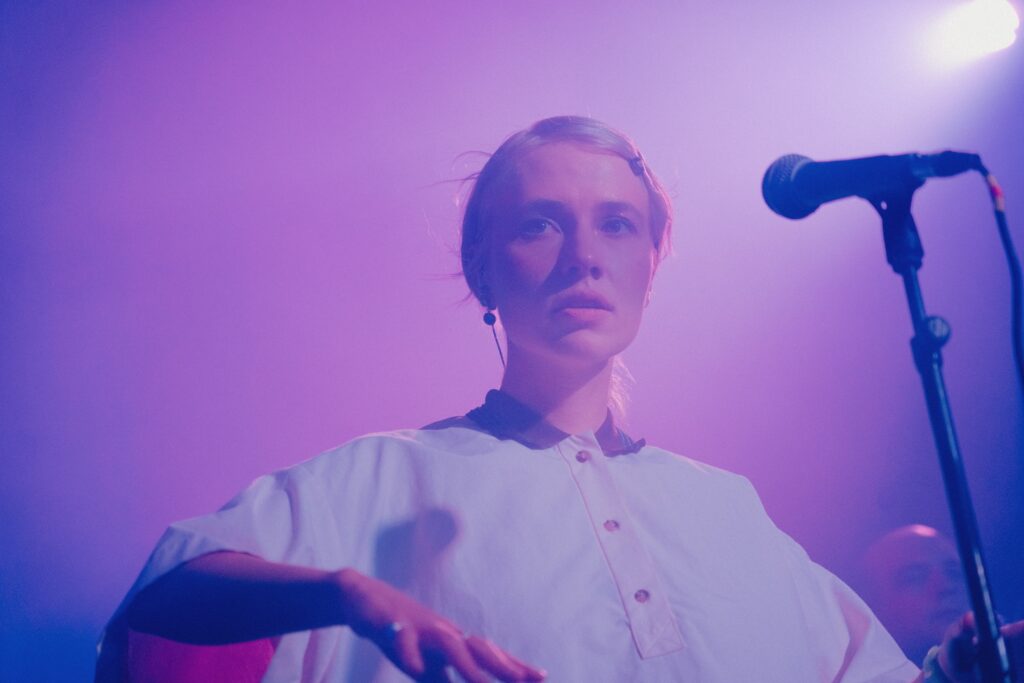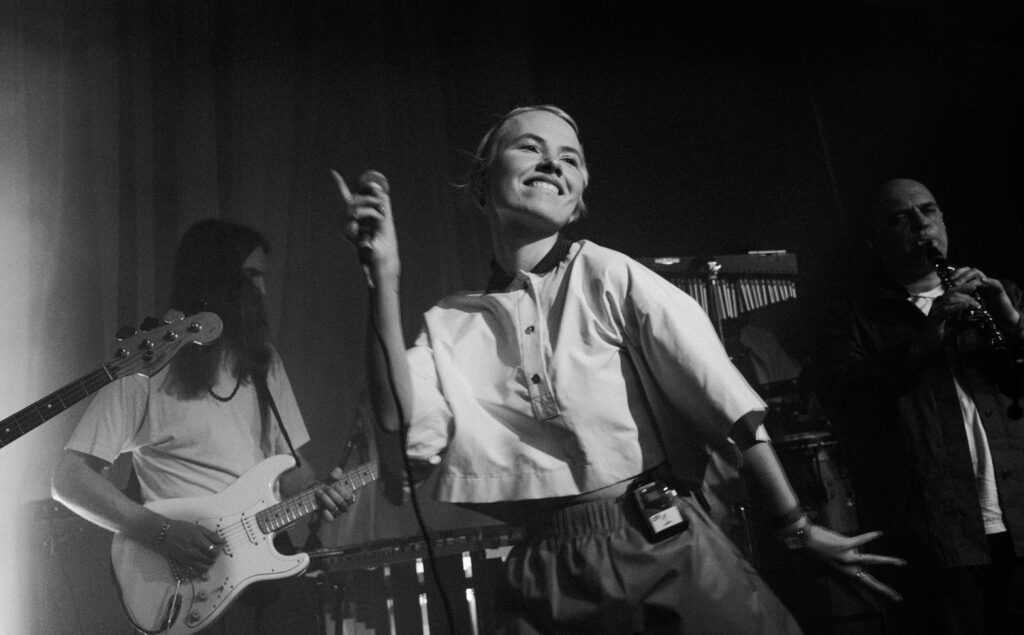
Dmirtii Bubonets
Apollo Frequencies is a series exploring sounds that seem to come from another world. In this week’s edition, Kate NV discusses the advent of her new live album Room for the Moon Live.
Kate NV was in a rut at the start of 2019. The Russian artist had spent half of the previous year on tour behind her experimental electronic album для FOR, hunched over her synthesizers as she improvised brand new music for every show. During a residency at Stockholm’s Elektronmusikstudion (EMS), she struggled with the studio’s famed Buchla synthesizer, trying to turn its precisely engineered outputs into something that sounded more human. Then something clicked: “This makes no sense,” she realized. “It was invented for the sake of doing the opposite thing.”
What she really wanted was to make an album of songs — songs with verses and choruses and, most importantly, singing. “I just wanted to sing and dance and have a full band play all the other stuff for me,” she tells me from her room in Berlin, where she’s lived for the past few months. Room for the Moon was the first of two albums (followed by WOW) that flowed out of NV in the two weeks after her EMS residency, recorded while she was still living in Moscow. Released in June 2020, its creation was a solo process, but she assembled an eight-piece band to play it live. Then COVID happened, making live performances impossible. When lockdowns lifted, the band started rehearsing again. But shortly thereafter, Putin invaded Ukraine and the group scattered to disparate corners of the world.
NV, too, left Russia when the war began, and this distance is on her mind as she talks about Room for the Moon Live, released last month, five years after the original. Recorded at one of the only three shows the group ever performed, its story is bittersweet: On one hand, it’s the consummate live album, encapsulating both the precision of the original project and the interplay of a band in peak form, improvising in perfect synchrony through extended jams. On the other hand, it reflects a reality that no longer exists. As the political turmoil in Russia has made it impossible for the band to get together, it’s difficult for Kate NV, and for those of us who love her music, to come to terms with the fact that this album’s beautifully imperfect humanity might never be captured again.
Room for the Moon came out in the thick of COVID lockdowns, but it was recorded much earlier, and you’ve described the process of making it as joyful. How had the album’s context changed for you by the time it came out?
I honestly think I’m cursed. Even though I made it at home by myself, this album always gave me a feeling that I wanted to recreate with a full-scale band, like Tears for Fears, for instance. I actually hate playbacks, even though I perform with them a lot. I love the feeling of a raw live band and the possibility of making a mistake. We started rehearsing with an eight-person band, and I even had the idea of making the next album after [Room for the Moon’s follow up] WOW with the band, but I don’t know if it will ever be possible, at least not anytime soon. I’m sure there are lots of cool musicians in Berlin, but the scene leans more toward electronic music and techno, so it’s quite the opposite of what I need. I’m not really looking for anyone right now anyway. All of the people playing on Room for the Moon Live are my good friends. They’re extremely talented, but they’re also very cartoonish characters. Everybody is insane in their own way. It’s so hard to give up on the idea of playing with them again. I’m stuck with those people in my heart and my head.
Tell me more about the group of musicians you chose for your eight-piece band.
I met most of them when we did a show in 2016 as the band for Doug Hreem Blunt. In New York and London, they found musicians on Craigslist. There’s no such thing as Craigslist in Russia, but my friend used to be an art director at this nice venue in Moscow, and she hired all of us to play together. We were from different music scenes, but we all connected, and we even started our own band, РТЫ.
What were the biggest challenges to arranging this very precise synth music for an eight-piece band?
At the beginning, I was trying to imitate the original synthesizer sounds as closely as possible, but then I just let it go. The most challenging part was to spread the sounds between the instruments and figure out which thing would be played by whom. But that’s what I liked about working with these guys. [Clarinetist Andrey Bessonov], for instance, is such an amazing musician. He feels the music so well that most of the time you don’t even have to explain it to him. The whole band is amazing.
You told me that you’d gotten sick of improvising on your own while touring для FOR. What did improvising in a group feel like compared to that?
It was super fun. Everyone was ready to fool around. On the track “Lu Na,” for instance, there’s a coda that’s a bit prog rockish. Most of us in the band are huge nerds, and we love bands like Gentle Giant, so at some point during rehearsal, we finished the song and just started playing, and it turned into this crazy, funny, stupid thing. When it was over, I was like, “Let’s just do it during the show,” and everyone was like, “Kate, you’re crazy. It’s garbage,” but we kept it. I always wanted to play in a prog rock band, so I loved it.
Was it hard for you to relinquish control of these songs?
I think we found a good balance. There were some elements that were crucial to sound as close as possible to the original because they make the song. But the rest of it, like with “Ça Commence Par,” for instance, was never very strict. When we first started rehearsing that track, I had the idea that everyone would have a solo, so we were going one by one, but in the end we decided not to do it like this because it’s very old-fart style, so we just jammed.
For “Du Na,” I drew a graphic score to explain how the track evolves because I wanted there to be a conversation between the clarinet, saxophone, and guitar. They all came up with some melodies that would appear and then disappear. Repeating everything the way it is on the record is a huge responsibility and it makes you feel kind of sad during the performance. This is not the kind of music that needs that. It needs to have the possibility of freedom in some moments and complete control at other points.

Dmirtii Bubonets
I love your interpolation of “Peter and the Wolf” at the start of “Ça Commence Par.” Was that planned or spontaneous?
It was spontaneous in rehearsal, and then we decided to leave it. I’m a huge fan of Prokofiev, and “Peter and the Wolf” was probably the first piece I loved as a kid. I still think that melody is genius. It’s as good as Swan Lake or anything else Tchaikovsky came up with.
What are your thoughts on live albums in general? Do you have any favorites?
I never listened to lots of live albums, actually. But what I love most about live performances and recordings is that they sound very humane. You can hear all the mistakes, and everything is so imperfect. Pop music right now is so perfect that it’s unrelatable. There are so many vocalists who sing perfectly, and you’re like, “Wow, this is incredible skill, but it’s kind of uncanny.” But then you listen to some ’80s and ’90s stuff, and it’s like, “Wow, people really didn’t give a damn. They were just singing.” It’s so freeing to realize you don’t have to try to reach that level of awesomeness.
That’s why I like Charli XCX. She’s amazing because she’s perfect in the way that she’s imperfect. She’s so normal and messy, and people love it because it’s so freeing. Even if someone takes a picture where she doesn’t look perfect, she’s like, “Yeah, this is gonna work.” I’m here for it because it’s hard to be awesome all the time.
